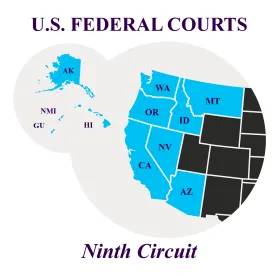In a unique case blending intellectual property and criminal law, the US Court of Appeals for the Ninth Circuit agreed that a district court properly exercised jurisdiction over a motorcycle club and upheld the lower court’s finding that the club did not have to forfeit its collective membership marks. United States v. Mongol Nation, Case Nos. 19-50176; -50190 (9th Cir. Jan. 6, 2023) (Ikuta, Forrest, Thomas, JJ.)
Mongol Nation is an unincorporated association comprised of Mongols Gang members and, per the district court, is “a violent, drug trafficking organization.” After a jury found Mongol Nation guilty of both substantive and conspiracy violations of the Racketeer Influenced and Corrupt Organizations (RICO) Act, the US government sought forfeiture of Mongol Nation’s rights in its collective membership marks—a category of “intellectual property used to designate membership in an association or other organization”—and specific property displaying those marks. A jury granted both forfeiture requests, but the district court granted forfeiture only of specific tangible property, not the marks themselves. The district court cited the First and Eighth Amendments: The First protected Mongol members’ rights to display their marks, and the Eighth prohibited the disproportionate remedy of forfeiture of marks that have “immense tangible” value to Mongol members. The government then filed another forfeiture application proposing that Mongol Nation forfeit its exclusive rights in the marks, meaning that Mongol Nation could not prevent others from using them, even in commerce, but that they would not transfer to or vest in the United States. The district court again denied this motion on First and Eighth Amendment grounds.
Both parties appealed, presenting two issues to the Ninth Circuit. Mongol Nation challenged the district court’s jurisdiction to hear the case because Mongol Nation is not a “person” under RICO. The government challenged the district court’s denial of forfeiture of the marks.
The Ninth Circuit summarily dealt with the first issue, noting that Mongol Nation did not properly raise this argument at the district court. The Court was not persuaded by Mongol Nation’s three-part argument that RICO defines an entity to be a “person” only if the entity has a legal interest in property, California only allows unincorporated associations to hold property if the association has a “lawful” purpose, and the indictment describes Mongol Nation as existing for an “unlawful purpose.” The Court found that the association misstated the indictment allegations, which said Mongol Nation’s purposes were “not limited to” the enumerated unlawful ones. Thus, because this argument was not properly preserved and because the RICO “person” definition did in fact encompass Mongol Nation, the Court found that the district court properly exercised jurisdiction.
The Ninth Circuit also affirmed the district court on the forfeiture issue, albeit for different reasons. Without reaching the district court’s First or Eighth Amendment logic, the Ninth Circuit stated that “RICO’s plain text” made the government’s forfeiture request “a legal impossibility.” The Court explained that, following a criminal conviction, a statute must enable property forfeiture. RICO does have such a penalty provision that encompasses both tangible and intangible property that a defendant used for RICO-related purposes. RICO requires factfinders to first determine whether there is a sufficient nexus between the RICO crime and the property in question. If a nexus is found, RICO requires forfeiture, as evidenced by the statute’s “shall forfeit” language. Therefore, regardless of any nexus, the remedy the government sought—that the Mongols surrender their exclusive rights in the marks, such that the marks simply become public property—is not allowed under RICO. Because the government failed to request that the marks vest in the United States, the remedy was “facially inconsistent with RICO’s forfeiture provision.”
Kat Lynch contributed to this article.



 />i
/>i
